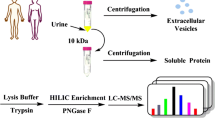Abstract
Urinary Exosomes (UE) are membranous nanometer-sized vesicles that can originate from endothelial cells, podocytes or tubular epithelial cells. Their molecular composition depends upon the type, and even status, of the producer cell. Their presence in urine makes them readily accessible, representing a liquid biopsy, non-invasive modality capable to provide diagnostic and prognostic information about kidney health state. Additionally, the UE proteome includes many species that are N-glycomodified. N-glycosylation is one of the most complex and frequent protein post-translational modifications, playing diverse biological roles. Additionally, it is reported that disease-specific glycosylation profiles of circulating microvesicles were detected in autosomal dominant polycystic kidney disease and ovarian carcinoma. This study is set in this context. Our aim is to provide the best MS-sample preparation protocol to study the UE glycosylated protein content, focusing our efforts on the enrichment of the glycosylated species and simultaneously depleting the most abundant contaminant protein (Uromodulin).
Access this chapter
Tax calculation will be finalised at checkout
Purchases are for personal use only
Similar content being viewed by others
References
Taniguchi N, Kizuka Y (2015) Glycans and cancer: role of N-glycans in cancer biomarker, progression and metastasis, and therapeutics. Adv Cancer Res 126:11–51
Williams C, Royo F, Aizpurua-Olaizola O, Pazos R, Boons G, Reichardt N, Falcon-Perez JM (2018) Glycosylation of extracellular vesicles: current knowledge, tools and clinical perspectives. J Extracell Vesic 7(1):1442985
Deeb S, Cox J, Schmidt-Supprian M, Mann M (2014) N-linked glycosylation enrichment for in-depth cell surface proteomics of diffuse large B-cell lymphoma subtypes. Mol Cell Proteomics 13(1):240–251
Author information
Authors and Affiliations
Corresponding author
Editor information
Editors and Affiliations
Rights and permissions
Copyright information
© 2020 Springer Nature B.V.
About this paper
Cite this paper
Santorelli, L., Barigazzi, E., Pitto, M., Raimondo, F. (2020). Investigation of the N-Glycoproteome in the Urinary Exosomes: Technical Challenges. In: Sindona, G., Banoub, J.H., Di Gioia, M.L. (eds) Toxic Chemical and Biological Agents. NATO Science for Peace and Security Series A: Chemistry and Biology. Springer, Dordrecht. https://doi.org/10.1007/978-94-024-2041-8_26
Download citation
DOI: https://doi.org/10.1007/978-94-024-2041-8_26
Published:
Publisher Name: Springer, Dordrecht
Print ISBN: 978-94-024-2040-1
Online ISBN: 978-94-024-2041-8
eBook Packages: Biomedical and Life SciencesBiomedical and Life Sciences (R0)




